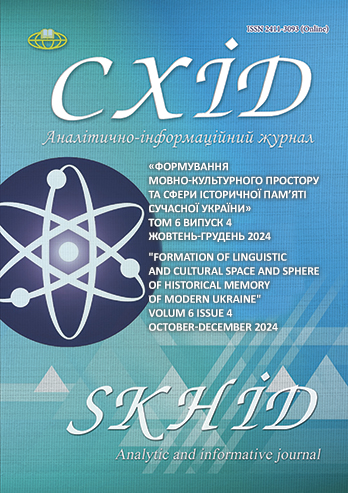Transhumanism in the context of Ethos of enhancement and search for Identity: philosophical origins
DOI:
https://doi.org/10.21847/2411-3093.2024.645Keywords:
transhumanism, ethos of enhancement, identity, self-transcendence as a virtue, cosmocentrism, theocentrism, anthropocentrism, constructivismAbstract
The article considers the problem of transhumanism in the context of the ethics of enhancement. It is noted that modern experiments on the transformation of human identity, the improvement of physical and intellectual capabilities of a person with the help of modern biotechnologies are just a modification of old idea of self-transcendence, which has always worried humanity. Pre-philosophical versions of human improvement within mythology outlined the horizon of the ethos of enhancement, its main directions. They consisted in ritual attempts to go beyond the constants of human identity: mortality, division into two sexes and intelligence. Accordingly, the foundations were laid for future directions of intellectual thought that comprehend these constants: immortalism, transgenderism and the philosophy of artificial intelligence. It is proved that within the classical tradition of philosophy there are three paradigms (cosmocentric, theocentric and anthropocentric), which, despite their individual characteristics, are based on the common idea of representation and the metaphysical opposition of essence and existence, which must be removed in the eschatological perspective of the “end of history”. In the non-classical tradition, metaphysical ideas of essence and representation are denied, and a new constructivist paradigm is put forward, which becomes the basis for the ethos of enhancement in general and the project of transhumanism in particular. At the same time, the article expresses concern that the constructivist non-classical paradigm, taken as the foundation for the ethical examination of transhumanism, contains significantly more existential risks than the classical representative one.
Downloads
References
Antonova, O.E. (2005). Giftedness: experience of historical and comparative analysis. Ivan Franko State Uni-versity of Zhytomyr, (in Ukrainian)
Bostrom, N. (2014). Superintelligence: Paths, Dangers, Strategies. Oxford university press.
Buchanan, Allen. (2011). Beyond humanity? The ethics of biomedical enhancement. Oxford university press.
Crowley, Aleister (1976). The Book of the Law (the "little red book" ed.). York Beach, Maine: Samuel Weiser
Deleuze, Gilles (1990). The logic of sense. [Translated by Mark Lester, Charles Stivale]. Columbia University Press.
Eliade, M. (1963). Myth and Reality (trans. Willard R. Trask), Harper & Row, New York.
Glasersfeld, E. von (2001). The radical constructivist view of science. Boston University Press.
Habermas, J. (2003). The Future of Human Nature [trans. William Rehg, Max Pensky & Hella Beister], Cambridge: Polity Press.
Heidegger, M. (1977). Basic Writings. New York: Harper and Row.
Heidegger, M. (2018). Heraclitus: The Inception of Occidental Thinking and Logic: Heraclitus’s Doctrine of the Logos. Bloomsbury Academic.
Helvétius, Claude Adrien (2019). A Treatise on Man, His Intellectual Faculties and His Education. [Translated from the French, With Additional Notes by W. Hooper]. (Reprint edition). Hardpress.
Khamitov N., Krylova S., Mineva S. (2009). Ethics and Aesthetics. Dictionary of Key Terms. Kyiv, KNT, (in Ukrainian)
Morozov, A., Nikulchev, M., Kulagin, Y. (2021). Religious experience and temptations of nihilism in spiritual life of personality. Beytulhikme. The international journal of philosophy, 11 (2), 683-697 https://doi.org/10.18491/beytulhikme.1647
Nietzsche, F. (2012). Thus Spoke Zarathustra (Barnes & Noble Signature Edition). New York, Sterling and Ross.
Rogers, Carl. (1961). On Becoming a Person: A Thera-pist's View of Psychotherapy. London: Constable
Rowan Douglas Williams, archbishop of Canterbury (1975). Theology of Vladimir Lossky: an exposition and critique. Thesis presented for the degree of Doc-tor of Philosophy in the University of Oxford. Wadham College, Oxford.
Sartre, Jean-Paul (2007). Existentialism is a humanism. Sterling and Ross, New York.
Scheler, M. (1960). The nature of philosophy and moral preconditions of philosophical knowledge. On the eternal in man. New York, Harper and Brothers publisher.
Downloads
Published
How to Cite
Issue
Section
License
Copyright (c) 2025 Юрій Пархоменко

This work is licensed under a Creative Commons Attribution-NonCommercial-NoDerivatives 4.0 International License.
1. Authors bear responsibility for the accuracy of facts, quotations, numbers and names used.
2. Manuscripts are not sent back.
3. The publisher does not always agree with the authors' opinion.
4. The authors reserve the right to authorship of the work and pass the first publication right of this work to the journal under the terms of a Creative Commons Attribution-NonCommercial-NoDerivatives 4.0 International License. This license allows others to distribute (copy) the published work for non-commercial purposes, provided there is mandatory attribution to its authors and a link to the first publication in our journal.
5. The authors have the right to conclude separate supplement agreements that relate to non-exclusive work distribution in the form in which it has been published by the journal (for example, to upload the work to the online storage of the journal or publish it as part of a monograph), provided that the reference to the first publication of the work in this journal is included.

